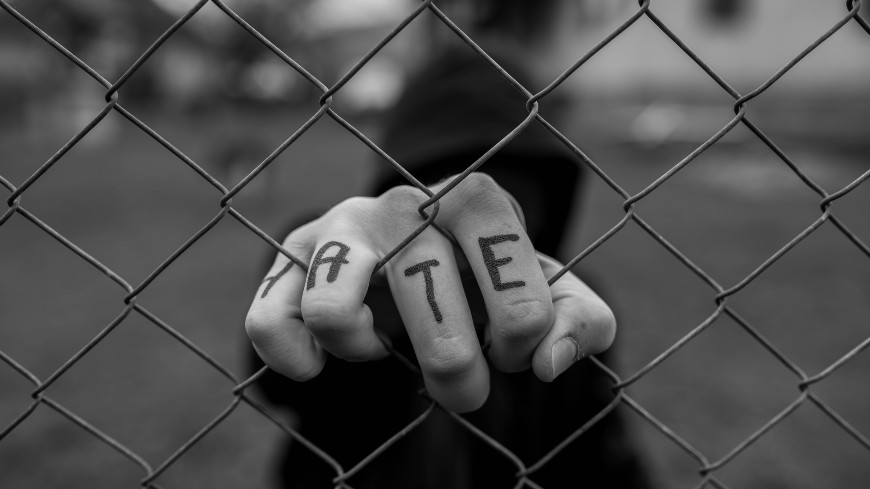Like fear, hate is considered bad and taboo, especially in New Age circles. Yet, both fear and hate are crucial, especially the former. It’s actually sustainable to experience hate, when worked with skillfully.
Hate is perhaps the most taboo and ostracized emotion. It’s usually immediately shut down as bad. Hardly anyone gives hate its due, especially with so many wise ones and memes saying it has no place in our lives.
Just like anger or fear, we can welcome hate, the inner experience of it, while not acting on it. We can let that feeling have the light of day inside us—so it is not relegated to shadow. After all, hate arises naturally, as do other emotions. We can’t control the feeling when it arises.
For myself, I welcome the feeling and experience of hate, uncomfortable as it is. It reflects my integrity and care for myself and others. For example, I hate Donald Trump for his lies, avarice, gross selfishness, violence towards women, immigrants, and Palestinians, as well as his trying to destroy democracy. I hated Biden for his enabling of the genocide in Gaza. I felt hatred towards a friend who recently verbally assaulted me because he failed to ask questions first, assumed and projected, and offered no amend. Just some examples.
Feeling hatred doesn’t mean I act on it. In fact, by feeling and befriending hate, I am less likely to act on my experience of it.
Hate, like any other emotion, has value. It alerts us to injustice and danger. It helps us feel and express being violated. It shows us what we do not like or want, and what threatens wellbeing and survival. When based on facts, hate identifies what does unnecessary and malicious harm, and what is evil.
Yet, many try to ignore and suppress hate because it’s socially taboo, at least in compassionate circles. We deny and suppress even the feeling and thought of it. Yet, wholesale sweeping of hate under the rug spells trouble. It increases the likelihood of acting it out as physical or verbal violence.
Whenever we shut down an emotion, especially wholesale, we consolidate it as shadow. This shadow usually acts out anyway, unconsciously, which perpetuates the violence incited by hate. It’s not that hate should be championed, but it does need to be respected and learned from. When we deny hate without a second thought, we also fail to harvest the good in it.
There is both healthy hatred and unhealthy hatred (read here about helpful vs. unhelpful fear). Healthy hate often arises when injury, undue violence, and injustice occur. Unhealthy hate is hating for no good reason, out of unhelpful fear, for superiority, for unjustly harming others, and for opportunistically enriching oneself at the expense of others.
Of course, it’s always wise to check our projections, to see if we can find the qualities of hate in ourselves that we detest in another. This is shadow work. It’s still valid, however, to hate and denounce malice caused by others, especially when acted out. We just have to make sure our emotional shadow doesn’t distort accurate perception and ascribe blame where it doesn’t belong. If we find the qualities we hate in others to also be in ourselves, then we have double work to do.
Do we act out our hate, or do we merely notice and allow the feeling? As a general guideline, it’s usually wisest not to act on our hate—physically or verbally. And certainly not impulsively. What then do we do with the feeling of anger and hatred that want to punish another for injuring us? This is where emotional and trauma work come in to help alleviate the damage done.
We can process our hurt, anger, and rage with a good friend, in therapy, or on our own, through the expressive arts, for example. After unloading some of its brunt, and if safe, we can express our hurt verbally to the abuser, without becoming physically violent.
If we do act in response to feeling hatred, hate should not be the only informant of our decision to act. Ideally, action should seek justice legally and non-violently. We should seek as much as possible to halt the cycle of violence. This is why we try to deal with intense feelings non-violently. Action should be carefully and rationally measured, which requires simmering down and not acting impulsively (unless in immediate, this-moment, survival danger). We should also make sure that we are accurate in our assessment of what we believe to be true. Ask questions, research, sit with it all for a time, let it mellow, allow and work to reduce its intensity.
When just feeling hatred is taboo and is given no place, it owns and harms us and others. Only by getting close to the inner experience of hate, owning and working with it, can we mitigate the toxicity experience of hate, preserve its good, and diffuse its destructiveness.


